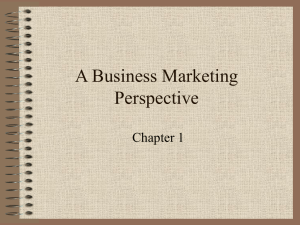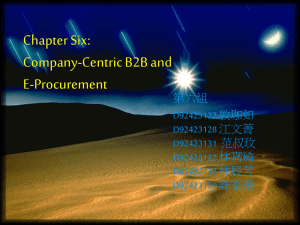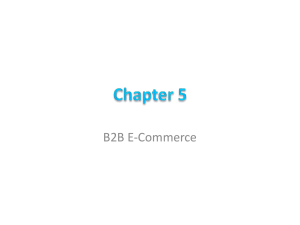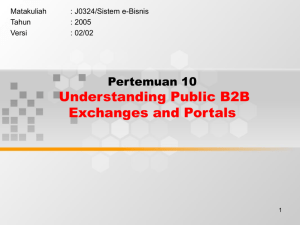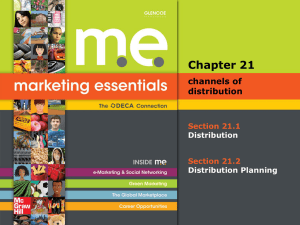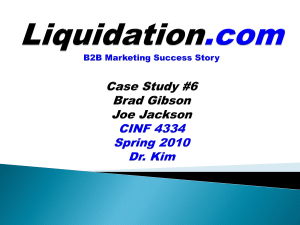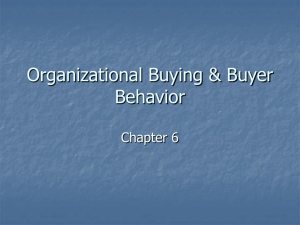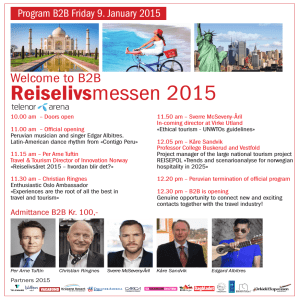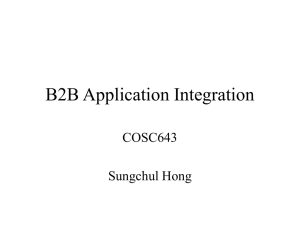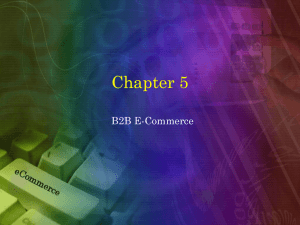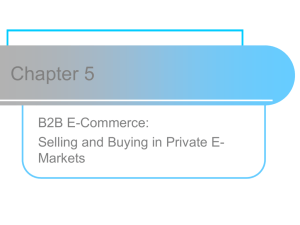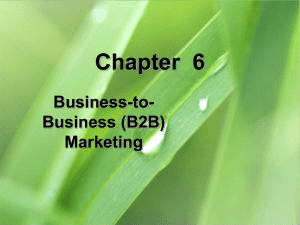B2Becommerce
advertisement
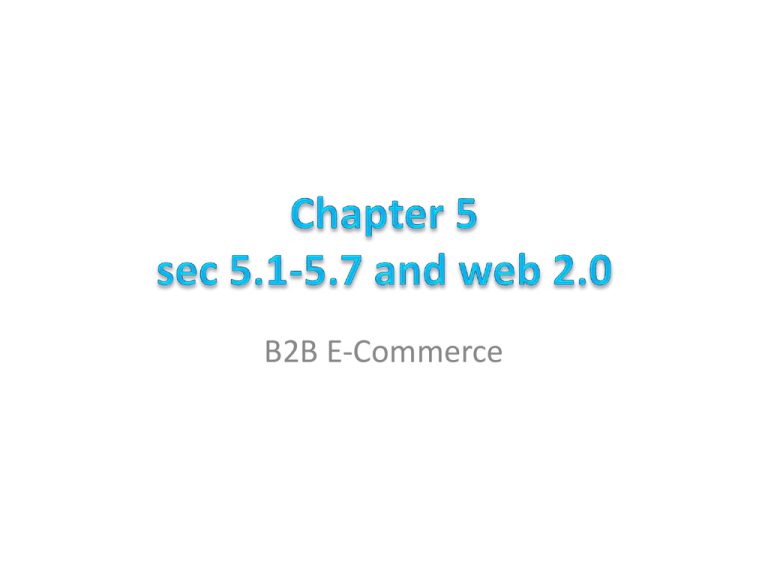
B2B E-Commerce 1. Describe the B2B field. 2. Describe the major types of B2B models. 3. Discuss the characteristics of the sell-side marketplace, including auctions. 4. Describe the sell-side models. 5. Describe the characteristics of the buy-side marketplace and e-procurement. 6. Explain how reverse auctions work in B2B. 7. Describe B2B aggregation and group purchasing models. 8. Describe other procurement methods. 9. Define exchanges and describe their major types. 10. Describe B2B portals. 11. Describe third-party exchanges. 12. Describe partner relationship management (PRM). 13. Describe how B2B can benefit from social networking and Web 2.0. 14. Describe Internet marketing in B2B, including organizational buyer behavior. • business-to-business e-commerce (B2B EC) Transactions between businesses conducted electronically over the Internet, extranets, intranets, or private networks; also known as eB2B (electronic B2B) or just B2B • THE BASIC TYPES OF B2B TRANSACTIONS AND ACTIVITIES – – – – Sell-side – one seller to many buyers Buy-side – one buyer to many sellers Exchanges – many sellers to many buyers Supply chain improvements and collaborative commerce e.g industry consortium SOURCES: eMarketer, Inc., 2009a; U.S. Census Bureau, 2009b; authors’ estimates. • THE BASIC TYPES OF B2B E-MARKETPLACES AND SERVICES – One-to-Many and Many-to-One: Private EMarketplaces • company-centric EC E-commerce that focuses on a single company’s buying needs (many-to-one, or buy-side) or selling needs (oneto-many, or sell-side) – Many-to-Many: Exchanges • exchanges (trading communities or trading exchanges) Many-to-many e-marketplaces, usually owned and run by a third party or a consortium, in which many buyers and many sellers meet electronically to trade with each other • public e-marketplaces Third-party exchanges open to all interested parties (sellers and buyers) • B2B CHARACTERISTICS – Parties to the Transaction: Sellers, Buyers, and Intermediaries • online intermediary An online third party that brokers a transaction online between a buyer and a seller; may be virtual or clickand-mortar – Types of Transactions • spot buying The purchase of goods and services as they are needed, usually at prevailing market prices e.g commodities, stock, etc • strategic (systematic) sourcing Purchases involving long-term contracts that usually are based on private negotiations between sellers and buyers e.g G2B – Types of Materials Traded • direct materials Materials used in the production of a product (e.g., steel in a car or paper in a book) • indirect materials Materials used to support production (e.g., office supplies or light bulbs) – The Direction of the Trades • vertical marketplaces Markets that deal with one industry or industry segment (e.g., steel, fordaq.com (timber)) • horizontal marketplaces Markets that concentrate on a service, material, or a product that is used in all types of industries (e.g., grainger.com, techdata.com) • SERVICE INDUSTRIES ONLINE IN B2B e.g. online travel services for businesses, online commercial real estate, etc • sell-side e-marketplace A Web-based marketplace in which one company sells to many business buyers from e-catalogs or auctions, frequently over an extranet – B2B Sellers e.g stapleslink.com – Customer Service • SALES FROM CATALOGS – Configuration and Customization – Benefits and Limitations of Online Sales from Catalogs – Channel conflicts – Difficulty in finding buyers • USING AUCTIONS ON THE SELL SIDE – Forward auctions offer the following benefits to B2B sellers: • • • • Revenue generation Cost savings Increased “stickiness” Member acquisition and retention • AUCTIONING FROM THE COMPANY’S OWN SITE e.g gmonlinauctions.com,auctions.samsclub.com • USING INTERMEDIARIES IN AUCTIONS e.g asset-auctions.com Exampls of Forward Auction • Whirlpool Corp. sold $ 20 million in scrap metal in 2003 via assetauctions. com, increas-ing the price received by 15 percent. • SAM’s Club ( samsclub. com) auctions thousands of items ( especially electronics) at auctions. • ResortQuest, a large vacation rental company, uses auctionanything. com to auction rental space. • buy-side e-marketplace A corporate-based acquisition site that uses reverse auctions, negotiations, group purchasing, or any other e-procurement method • PROCUREMENT METHODS – E-Procurement Organizations and Types • E- sourcing. Identifying new suppliers for a specific category of purchasing requirements. • E- tendering. Sending RFI and prices to known suppliers and receiving the suppliers’ responses and bids. • E- reverse auctioning. Using Internet to buy goods and services from a number of known or unknown suppliers. • E- informing. Gathering and distributing purchasing information both from and to internal and external parties. • Web- based ERP ( electronic resource planning). Creating and approving purchasing requisitions, placing purchase orders, and receiving goods and services by using a software system based on Internet technology. • THE GOALS AND BENEFITS OF E-PROCUREMENT – e-procurement The electronic acquisition of goods and services for organizations • request for quote (RFQ) The “invitation” to participate in a tendering (bidding) system • CONDUCTING REVERSE AUCTIONS – E-Tendering by Governments • GROUP REVERSE AUCTIONS e.g. http://www.imarketkorea.com/en_HD/index.html • internal procurement marketplace The aggregated catalogs of all approved suppliers combined into a single internal electronic catalog • Benefits of Internal Aggregated (Consolidated) Catalogs – Quickly find what desired offering – check availability and delivery times – complete electronic requisition forms using fewer suppliers – Avoid Maverick/unplanned Buying • desktop purchasing for small ticket items Direct purchasing from internal marketplaces without the approval of supervisors and without the intervention of a procurement department • group purchasing The aggregation of orders from several buyers into volume purchases so that better prices can be negotiated – Internal Aggregation of Purchasing Orders – External Aggregation for Group Purchasing e.g buyerzone.com • THE OPPORTUNITIES – Discover new business partners – Improve recruitment e.g linkedin – Enhance ability to learn about new technologies, competitors, etc. – Find sales prospects – Improve participation in industry association activities – Better networking amongst employees • THE USE OF WEB 2.0 TOOLS IN B2B (e.g blogs, wikis, RSS feeds, etc) • FUTURE of SOCIAL NETWORKS IN THE B2B MARKETPLACE • According to eMarketer ( 2008), advertising on social networking sites will grow from $ 15 million in 2007 to $ 240 millions in 2012 • EXAMPLES OF OTHER ACTIVITIES OF B2B SOCIAL NETWORKS • IBM currently has approximately 116,000 employees registered on LinkedIn • Microsoft has around 25,000 as of November 2008. • ORGANIZATIONAL BUYER BEHAVIOR – A Behavioral Model of Organizational Buyers • THE MARKETING AND ADVERTISING PROCESSES IN B2B e.g online directory services, matching services, the marketing and advertising • METHODS FOR B2B ONLINE MARKETING – Targeting Customers e.g using trade magazines and or trade association records – Electronic Wholesalers • DATA MINING
